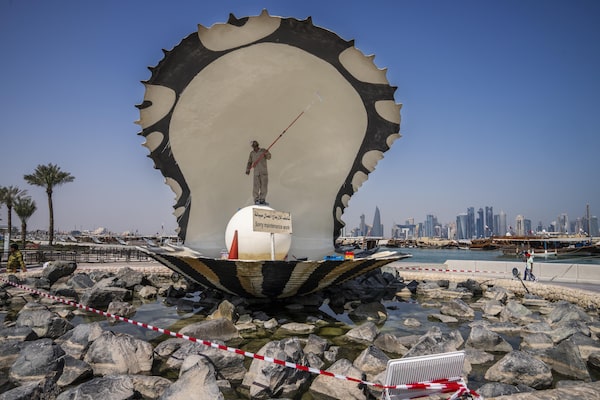
A migrant labourer paints The Pearl Monument, a sculpture depicting an open oyster shell with running water, on the corniche overlooking the skyline of Doha, Qatar, on Oct. 19. The World Cup has thrown an uncomfortable spotlight on Qatar’s labour system, which links workers’ visas to employers and keeps wages low for workers toiling in difficult conditions.Nariman El-Mofty/The Associated Press
Victor Matheson is an economics professor at College of the Holy Cross in Worcester, Mass.
Although it is unlikely that a full accounting will ever be made public, it is estimated that Qatar will have spent between $300-billion and $400-billion preparing for the current World Cup, a four-week event. Not only does this make Qatar’s World Cup the most expensive in history, but the total costs may exceed the costs of every World Cup, Summer Olympics, and Winter Olympics in history … combined.
So, how does Qatar plan to earn a return on its massive investment? The only plausible explanation for Qatar’s desire to host the world’s biggest sporting event is as a way to burnish the country’s image worldwide through an activity known as “sportswashing.”
Russia and China have been accused of doing it with their hosting of recent Olympic Games. As has Saudi Arabia with Formula One, LIV Golf and the Diriyah Tennis Cup. Authoritarians have spent billions upon billions to try to buy international goodwill.
But sadly (for the authoritarians, at least) these efforts rarely work. The World Cup in Qatar is but the latest example of the failure of sportswashing.
To be clear, big sporting events typically don’t generate a financial windfall for host countries. The World Cup is a big money-maker for FIFA – soccer’s world governing body – which stands to generate nearly $6.5-billion for media rights and sponsorships from the tournament. But not only is that figure a fraction of the Qatar’s outlay, none of it goes to the host country to cover their costs. FIFA does provide funding for prize money and some operational expenses such as television production and team logistics, but this is a drop in the bucket compared with Qatar’s spending.
Opinion: I love soccer but I won’t be watching the World Cup
The hundreds of thousands of soccer fans who have descended on Qatar from around the world will no doubt contribute to the tiny nation’s economy, but with limited stadium and hotel capacity, even the most optimistic estimates of tourism revenue will amount to less than 2 per cent of Qatar’s preparation costs.
Much of Qatar’s infrastructure spending won’t meaningfully contribute to the country’s future economy, either. The roughly $10-billion spent on seven new stadiums is entirely wasted in a country where the domestic soccer league attracts average crowds of less than 1,000 spectators per game. Many of the stadiums will be downsized and repurposed after the tournament, and one facility, Stadium 974 will be entirely dismantled after its final match. Even more general infrastructure projects, such as hotels and roads, are likely to go unused after the World Cup because of Qatar’s tiny population.
The only true potential benefit of hosting the World Cup is reputational. Every telecast from Qatar serves as a mini-advertisement portraying the country as a shining modern oasis in the desert, and the tournament was supposed to introduce the world to Qatar, a country that many North Americans had never heard of, much less been able to find on a map.
But unfortunately for the World Cup hosts, the world has not liked a lot of what it has learned about the country. We now know that with only 300,000 citizens in the country, the vast majority of the construction done for the World Cup was performed by immigrant labourers often toiling under brutal working conditions that have been compared to modern day slavery.
The world has learned that Qatar is a deeply conservative country where alcohol is highly restricted and both free speech and the media are repressed. Journalists have been stopped for simply filming in public areas. Despite advertising itself as a welcoming place for all fans, Qatari laws punish same-sex relationships with up to seven years in prison, and soccer fans have been denied entry to matches for simply wearing T-shirts or armbands in rainbow colours. Qatar has introduced itself to the world as a country where women need permission from male guardians to get married, travel abroad, obtain higher education or work at certain jobs.
All that follows a selection process for the host country marred by credible allegations of corruption and bribery. Like the famous Barbra Streisand effect, Qatar’s attempt to embellish has only brought more attention to its flaws.
In the end, Qatar will emerge from the World Cup not so much famous as infamous. Its $300-billion is likely to have been better spent hiding away from the modern world rather than introducing itself to it.